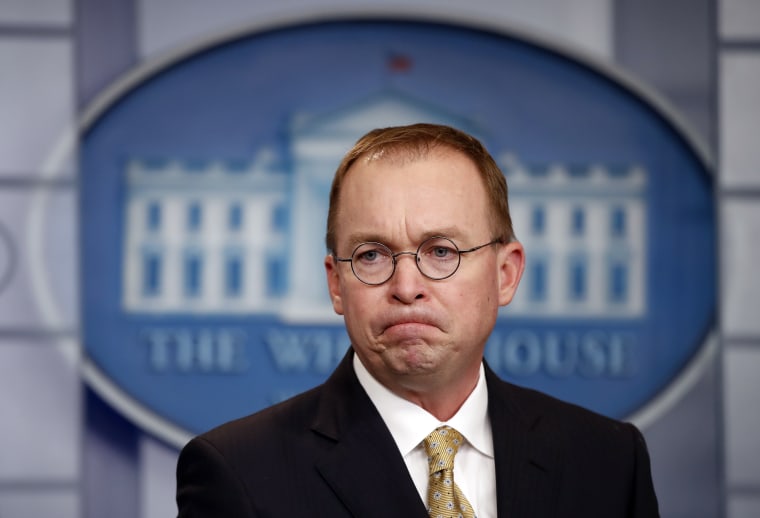The most memorable line from Donald Trump's State of the Union address was, oddly enough, an implicit threat. "If there is going to be peace and legislation, there cannot be war and investigation," the president declared. "It just doesn't work that way!"
The message wasn't subtle: Trump is only prepared to work constructively with Congress on legislation if lawmakers agree to look the other way on his many scandals. The more Democrats exercise their oversight responsibilities, the less the White House will agree to cooperate on public policy.
The ultimatum was striking in its simplicity: Trump believes Congress will have to choose between tackling substantive issues and scrutinizing his most glaring controversies -- because he won't tolerate both.
On "Fox News Sunday" yesterday, Chris Wallace asked acting White House Chief of Staff Mick Mulvaney whether the president recognizes the importance of Congress' oversight role. Mulvaney said Trump is "not trying to discourage" lawmakers from completing their duties, but he is telling them, "We can either work together on legislation or we can spend all our time with you doing investigations, but you can't do both." (That sounds like he's "trying to discourage.")
It led to this exchange:
WALLACE: Wait, you can do both and presidents have done both plenty of times.MULVANEY: Right. But don't -- again, it's not reasonable to expect the president to work with you on Monday on a big infrastructure bill, and then on Tuesday, have you punch him in the face over 15 different investigations. [...] It's very difficult to do both. I just think that's human nature.
The reference to "human nature" was of particular interest, because to hear Mulvaney tell it, investigations will hurt Trump's feelings. And if lawmakers make him feel bad, "human nature" dictates that he won't want to work with federal policymakers on issues of national significance.
The reality, whether Trump appreciates this or not, is that the presidency is a profoundly difficult job, which occasionally requires leaders to work with people they disagree with. Presidents don't have the luxury of telling powerful lawmakers, "I'm mad that you scrutinized my scandal, so I'm taking governing off the table."
But then Mulvaney added something else that he probably shouldn't have.
The host reminded the acting White House chief of staff, who used to be a far-right Republican congressman, that GOP lawmakers investigated assorted controversies, including Benghazi, during Barack Obama's presidency, but the Democrat "got some things done despite the fact that these were aggressive partisan investigations."
Mulvaney responded, "Listen, I'll be the first to admit that when the Tea Party wave, of which I was one, got here in 2011, the last thing we were interested in was giving President Obama legislative successes."
Mulvaney has a curious habit of blurting out embarrassing truths. About a year ago, for example, he spoke to a group of bankers how they could use their money to influence the administration's agenda, confessing at the time that during his congressional career, he would only meet with lobbyists who gave him campaign contributions.
Yesterday's candor was similar. Trump has insisted repeatedly of late that GOP lawmakers were nothing but respectful and considerate toward the Obama White House, but there was his chief of staff on national television yesterday, conceding he and his colleagues made it a priority to deny the Democratic president legislative victories.
In context, he was responding to a question about Republicans investigating matters such as the terrorist attack in Benghazi, suggesting Mulvaney saw a connection between investigating faux "scandals" and undermining Obama's prospects for "legislative successes."
All of which helps shed light on Mulvaney's posture now: in his mind, congressional oversight isn't a function of checks and balances; it's a political game intended to undermine presidents. After all, that's how he and his cohorts saw it in 2011, so it must be how Democrats are approaching their responsibilities now.
The difference, of course, is that Trump's many scandals are real. Congressional oversight is necessary. The idea that Democrats must turn a blind eye to meaningful, ongoing controversies, or the delicate president will have no choice but to sulk in the White House and scrap his legislative agenda, is plainly ridiculous.
